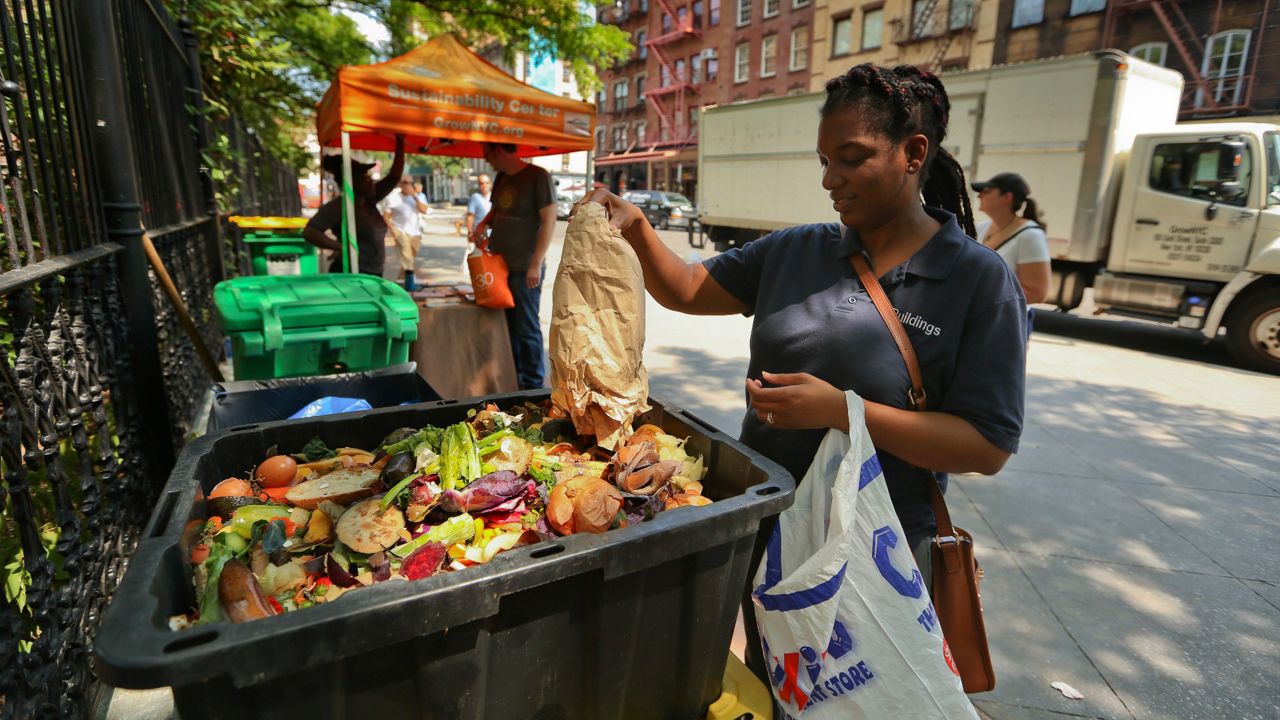New York City will roll out “guaranteed” curbside composting in Queens this fall — a move that will make the borough home to the largest program of its kind in the country, officials said Monday.
The city’s Department of Sanitation will start picking up residents’ food scraps, yard waste and “food-soiled paper products” on a weekly basis on Oct. 3, Mayor Eric Adams said at a news conference at the Unisphere in Flushing Meadows—Corona Park Monday morning.
Buildings with 10 or more units will automatically receive free sealed composting bins, Sanitation Commissioner Jessica Tisch said at the briefing. The city will also deliver a free bin to any resident who requests one before Oct. 1.
What You Need To Know
- The city will roll out "guaranteed curbside composting in Queens starting Oct. 3, Mayor Eric Adams said Monday
- Buildings with 10 or more units will automatically receive free sealed composting bins, Sanitation Commissioner Jessica Tisch said. The city will also deliver a free bin to any resident who requests one before Oct. 1
- The Department of Sanitation will collect "leaves, yard waste, food waste [and] all food-soiled paper," Tisch said
- Residents who do not request a bin from the city will be allowed to put their own bins on the curb, as long as they have lids, Tisch noted
“When we suspended the composting program [in 2020], I said that we’re going to bring it back, but we’re going to bring it in a more equitable and a more cost-efficient way,” Adams said. “This is keeping the promise that we stated.”
Composting in the five boroughs took a significant hit when the city temporarily suspended the program, which was serving approximately 3.5 million residents before the COVID-19 pandemic.
“This is a no-frill way of just getting it done,” the mayor added. “Without the bureaucracy and the difficulties of signing up for a program.”
New York City residents put approximately 24 million pounds of trash and recycling out on their curbs each day, amounting to “three pounds of trash for every New Yorker,” Tisch said.
Eight million of those 24 million pounds are compostable, the commissioner noted.
“Today, that organic material goes in the black trash bags, where it’s commingled with all the other household trash, and it sits on the curbs, serving, as we said before, an all-you-can-eat buffet for rats,” she said. “Adding more insult to injury, it then gets landfilled, where the material decomposes and produces harmful methane gas for years to come.”
While the city’s previous composting programs have had varying levels of success, the city has taken steps to ensure the new initiative will be more effective, Tisch said, including broadening its reach and making it “stress-free” by providing all larger buildings with free bins and pickup service.
Residents who do not request a bin from the city will also be allowed to put their own bins on the curb, as long as they have lids, she noted.
“Our trucks will roll to every address in Queens once a week, period,” she said. “We’ll take your leaves, yard waste, food waste, all food-soiled paper — napkins, plates. Just set it out once a week, on your organics collection day, and we’ll come collect it.”
The first phase of the program will run from Oct. 3 through “late December” before pausing for three months, as residents generate “little to no yard waste” in the winter, Adams and Tisch said in a press release.
Yard waste is the “primary driver of tonnage collected — producing far more compostable material than food scraps,” the release said. Curbside service will pick back up in late March of next year.
In addition to rolling out curbside composting this fall, the Department of Sanitation will expand its existing network of “Smart Compost” bins by installing 250 new containers in parts of northern Manhattan, the south Bronx, central Brooklyn and Staten Island, Tisch said Monday.
“New Yorkers want to do the right thing, and with this program it will be easy for them,” she said. “Starting Oct. 3 in Queens, let’s close down the rat buffet by getting food out of the black bags, and let’s shutter the methane factory by turning organic material into compost and green energy.”
In a statement provided to NY1 on Monday, GrowNYC President and CEO Marcel Van Ooyen, whose organization runs food scrap and clothing drop-off sites across the five boroughs, called Adams’ announcement a “critical step toward realizing curbside composting citywide.”
“GrowNYC has proudly partnered with the Department of Sanitation to deliver our Zero Waste programs since 2006 and has supported DSNY’s precedent-setting work to pilot and expand the Curbside Composting Program,” Van Ooyen said.
“During that time, we have witnessed the positive impacts that composting has on public health and our environment by giving people an easy tool for fighting climate change and a way to turn their food scraps into usable compost for our parks, gardens and playgrounds,” he added.



